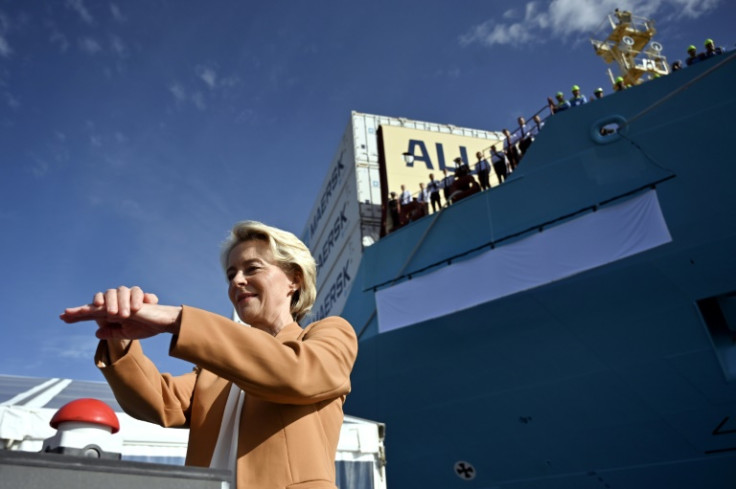
European Commission head Ursula von der Leyen on Thursday christened the world's first bio-methanol container ship, Laura, which joined the fleet of Danish shipping giant Maersk.
Built in South Korea by Hyundai Heavy Industries (HHI) and fitted with a dual-fuel engine, Laura is a relatively small model that will be able to transport 2,136 20-foot (TEU) containers.
It will begin operating in the Baltic Sea in October, Maersk said.
"Green methanol is our fuel of choice ... because it is the only scalable solution that can meet the net-zero (carbon emissions) requirements," Maersk chief executive Vincent Clerc said during Thursday's inauguration ceremony in Copenhagen's harbour.
"Neither we nor the climate can afford complacency or waiting for other solutions to emerge in the late 2020s," he added.
In line with tradition for christening vessels, von der Leyen then swung a bottle of champagne across the ship's hull.
Green methanol, also known as "e-methanol", is composed of waste carbon dioxide (CO2) and "green hydrogen", which is created by using renewable energy to split water molecules.
Over the past two years, Maersk, the world leader in container shipping, has ordered 25 vessels that run on green methanol.
Of them, 19 are under construction and should set sail by 2025.
The company estimates this will enable it to reduce its annual carbon dioxide emissions by around 2.3 million tonnes.
Laura alone will help reduce its CO2 emissions by 100 tonnes a day, compared to the same vessel running on fuel oil, it said.
On a global scale, maritime transport is more polluting than air transport, according to the Higher Institute of Maritime Economics (ISEMAR).
The sector accounts for 2.89 percent of total greenhouse gas emissions, according to the latest figures published by the International Maritime Organisation.
Maersk, which sold its oil division to TotalEnergies in 2017, aims to become carbon neutral by 2040.




